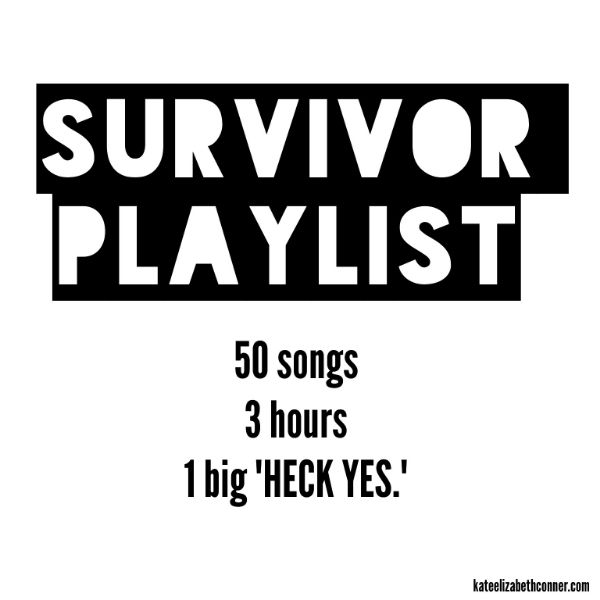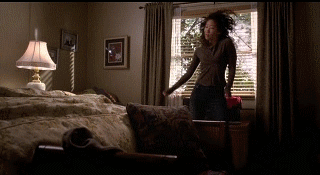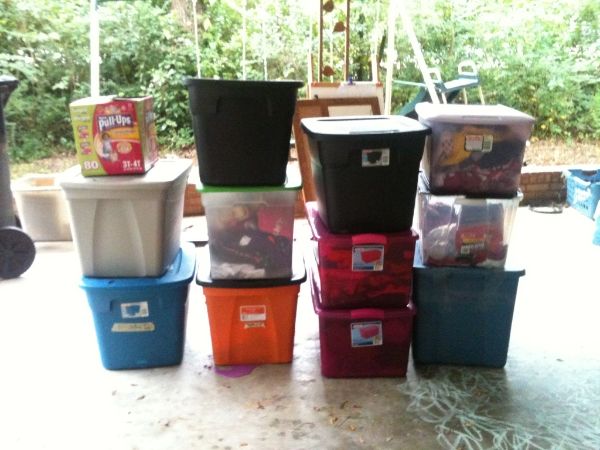This is the last week of #SurvivorSeries. This week I'm sharing a Survivor playlist (**fist pump**), hosting a giveaway (holla), and we're talking about surviving "The News."
There is news, and then there's The News.
The News is cancer. Autism. The affair. Fired. The News is cops at your door saying, "There's been an accident." The News comes in all shapes and sizes and it is always catastrophic. An earthquake in your soul, cracking and upheaving the foundations of your life. The things you thought would never change - change.
Tomorrow, I'll share a short post (because when you get The News, you can't be bothered with things like WORDS or ADVICE) about how to start surviving The News. Not how to get through or find hope. Just how to live.
Today, I'm re-sharing a post about a time that I received some News. It is one of the first posts that ever appeared on this blog - I copy/pasted it from a Word document I'd been using as a journal. I deleted all the cuss words. (If you're getting News right now, email me. I'll send you the cussy paragraphs.)
__________________________________
A journal (literally) of the hours, days, and weeks following Madeline's diagnosis. That you may share in our (eventual) joy and amazement.

April 17, 2008
“I’m going to be honest with you Mrs. Conner; I’m not sure how well she can see at all.”
Deep breath.
“She has decreased vision; probably congenital. It’s possibly an optic nerve problem.”
The weight of a continent is on my chest.
“She has a searching nystagmus - the reason her eyes roll is that she’s looking for anything she can see. I wish I had better news for you. She needs to go to Emory for further tests. I’ll make you an appointment for next week, but you need to know that I don’t think time will matter much here. I’m sorry.”
I must look like a frightened animal.
Wait, what? You’re telling me there’s something wrong? Like, really wrong?
Oh, baby. My baby.
Have you been living in darkness this whole time?
Have you ever seen my face?
The world is spinning and I am sick.
I can’t get out of this office fast enough. Something inside of me has snapped and I am consumed; all I want in the whole world is to get home and hold her. I don’t want doctors, I don’t want information. I don’t want encouragement, I don’t want prayers, I don’t want lunch. I need to get home NOW. I need to get home and hold her all day long. I’ll feed her and rock her and sing to her and let her fall asleep on my chest. I’ll kiss the top of her peach-fuzzy head and tell her everything will be okay. We’ll take care of those eyes. Those big, beautiful blue eyes.

Later that evening
There are five days before our appointment at Emory. 120 long hours. That’s a lot of time to think. Is it something I did while I was pregnant? Something I ate, maybe? Did I not take enough vitamins?
No – I’m assured by a still small voice, “‘Who sinned, this man or his parents, that he was born blind?’ ‘Neither this man nor his parents sinned’, said Jesus, ‘but this happened so that the work of God might be displayed in his life.’” John 9:3.
What if it can’t be fixed? They can fix anything these days, right? I’m not afraid of surgery or medical bills. I’m afraid she’s going to have to live with whatever this is for the rest of her life. In my heart, I think I already know. I’m really not even worried – I’m just sad for her. Yes, fear has given way to sadness, and it is unbearable. It’s not fair. What did she ever do? She’s just tiny and small and soft.
God is good all the time. My life has changed – God has not. He’s good – and I know that.
Think clearly, Kate. Worst case scenario: she’s blind. Helen Keller was blind, Fanny Crosby was blind, Ginny Owens is blind. Blind women can live full, meaningful lives. I wonder how hard it is to learn Braille. Oh, God, don’t let other kids make fun of her. Please, please don’t let them make fun of her; she’s too sweet. I will level some idiot fourth grader to the GROUND if he teases my Madeline for this. Oh, Lord, don’t allow her to feel un-beautiful for even a minute.
And here springs my very first positive thought: This is why God made me to love words, why I learn languages well. This is why music is so close to my heart. Why He made me a teacher – so that I can communicate with my daughter in ways that have nothing to do with vision.
After all, this is not a surprise to God. To us, certainly, but not to God. Madeline was born this year, this time, to these doctors, and to these parents. Me and Dan. I was created to raise her.
“All the days ordained for me were written in your book before one of them came to be.” Psalm 139:16
I’m thinking of Hannah Hurnard’s words. “…In the life of a child of God there are no second causes, even the most unjust and cruel things, as well as all seemingly pointless and undeserved sufferings, have been permitted by God as a glorious opportunity for us to react to them in such a way that our Lord and Savior is able to produce in us, little by little, his own lovely character.”
It will be glory if, somehow, we live more like Jesus because of this.
April 22, 2008
Optic Nerve Hypoplasia.
“See, she doesn’t blink or squint like most children do when I shine this light in her eyes. Her optic nerves are 5 percent of normal size. Think of a garden hose, the smaller the hose, the less water that can pass through it. Optic Nerves connect her eyes to her brain in the same way; so with underdeveloped nerves there is no way for information to pass from her eye to her brain. Her eyes are healthy; it’s the nerves that caused the vision impairment.”
Let’s cut the doctor speak. I can read between the lines. You can say ‘blind,’ I won’t freak out. My little girl is blind.
“She will never be able to see like you and I can see, but it’s possible that her vision may improve marginally by the time she’s one year old.”
Marginally. She may be able to tell the difference between day and night? That’s a pathetic attempt at good news. Suddenly there is poison in my heart. Bitter, angry poison. God, it’s not fair. She never did anything wrong. Why would you make her live with this disability for the rest of her life? It’s too terrible. To never see sunrises or sunsets. She won’t see the ocean. Mountains. Wildflowers. Waterfalls. Lightning. Color.
“There is no known cause for this condition. It just…happens. And unfortunately, there’s no known cure or treatment either. Here.”
He hands me a card for CVI – The Center for the Visually Impaired – and for Blind Services in Atlanta. It didn’t register, I just stared at the card; it felt alien in my hand. I’m thinking, “I won’t need this card, I don’t need this.”
As we leave the hospital, we start making phone calls. To all the people who wanted us to let them know right away; they had been praying for us. How do I even start these conversations? There’s no good way to do it, no matter how you phrase it, it still punches all the breath out of you.
“Hi Dad, it’s me. We’re driving home from the doctor now and … she’s blind.” The words fall like an anchor, an anvil. I make my way through the long list of phone calls, listening to people on the other end of the line grope for words. It's not their fault; there’s nothing to say.
No tears yet, just numbness. I suppose we’ll just go home, eat supper, and keep living.
One week later
Dan is having a really hard time. A friend of mine, who works with children with disabilities, says that dads often take it the hardest, because dads are fixers: heroes and protectors of their baby girls. I’m sure she must be right, because here is my Dan, a first-time dad smitten with tiny Madeline – and there’s not enough money, enough love, enough medicine in the world to fix it.
We are grieving a loss, and I’m learning that all of the stages of grief apply: denial, anger, bargaining, depression, and acceptance. I don’t really know where I am; I am floating, but Dan is very, very angry. We were playing around with a conversation book tonight – asking each other funny questions for the sake of lighthearted conversation that had nothing to do with disability income or MRIs. One of the questions asked “If you had to wear a button on your shirt that summed up your outlook on life in five words or less, what would your button say?” Dan’s response, without skipping a beat, was “God made my daughter blind.”
Dads definitely take it the hardest.
April 30, 2008
I feel like my life has started over from the beginning and I’m having to re-do all the difficult ‘firsts.’ The first time she cried in her crib AFTER we knew: I couldn’t bear to let her put herself back to sleep. I rushed in, touched her, and whispered, “I’m here, I’m here. You can’t see me, but Mommy’s right here.”
The first time I left her with my mother-in-law so I could run errands: I gave Sandra a 30-minute crash course, left pages of instructions, and shed tears on the way to the store. And the first Sunday we walked into church: Everyone knew, and they looked at us. All the same look: heads cocked a little to the side, sad eyes, grim smiles. The sanctuary was thick with pity and I tried to make eye contact with as few people as possible. Only a few decided to say something to us. Most of them, in hindsight, were well meaning and kind, but they just didn't understand - and it was awful.
“At least it’s only her eyes.” Excuse me?
“Well, you know, everything works together for good.” Your daughter didn’t have to be blind for the good.
“I know how you feel, my nephew is legally blind and he had to have all these surgeries…” Let me stop you right there. Your nephew? He had surgery options? You have no idea how we feel.
And so, I am indebted to a few tender people, full of compassion and wisdom that said helpful things during these first weeks.
My Aunt Jan said, tearfully, “Kate, I’m so sorry.” And my mother, in response to my statement “I just want to hold her” said, “I just want to hold you.”

- (The "Prayer Jar" we received as a gift the week we got home from the hospital. A blessing. How frightened and exhausted do I look?)
May 1, 2008
The next step is an MRI to make sure that the rest of her brain is developing normally. Apparently a large percentage of babies who have optic nerve problems also have a bunch of related conditions. Their hypothalamus and pituitary gland are affected. They have to take hormone treatments for growth hormones, stress hormones, and thyroid regulation. Sometimes adjacent parts of the brain are missing as well, causing learning disabilities and developmental problems.
Yesterday I spent the whole afternoon on the phone. A call to the children’s hospital to schedule an MRI. A call to Emory’s children’s center to schedule the endocrinologist. A call to social security to apply for disability benefits. It’s amazing how many questions a man named Douglas can ask about our income, assets, accounts, and medical history. (In the end, we were denied.) A call to Georgia Pines, an association that works with disabled children. Another call to Babies Can’t Wait – a local resource for parents with disabled children. Physical therapy. Occupational therapy.
I am now officially a project manager. My PR major is coming in handy after all. Yes, I was created to raise her.
To be continued...

- (9 months later, first steps.)
-
If you want to fast-forward to the end of the story, here is the most recent post I've written about Madeline's vision: "Letter to 22-Year-Old Me"
You can find the things I've written about vision loss by clicking the Vision Loss tag here.
The Survivor Series giveaway is still live! Share a #survivorseries post for a chance to win $150+ in coffee, music, books, and other survival essentials. Click here for details.
You guys, I wrote some books! They’re really good and if you buy them and read them I will bake you cookies.* You can get it on Amazon, from Barnes & Noble, and in bookstores August 1.
*and eat them myself because you live too far away.









